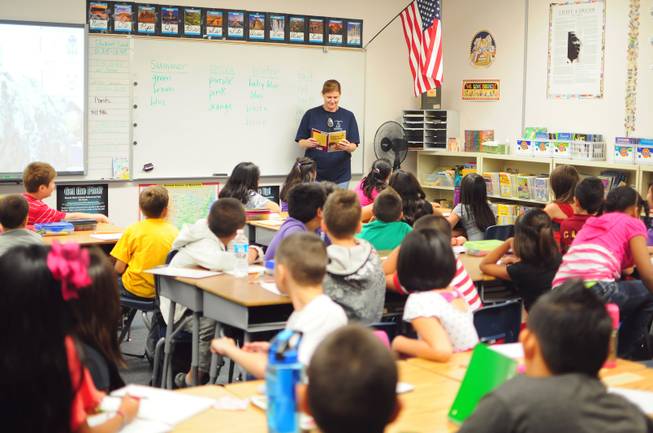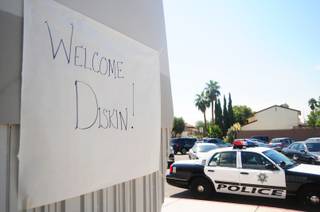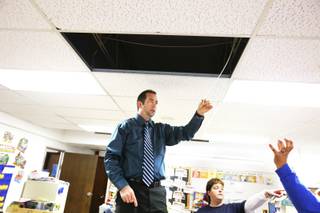
Decker Elementary School teacher Kim Jeter reads to a 51-student fourth-grade class on Wednesday, Sept. 5, 2012. The air-conditioning system at the nearby Diskin Elementary school, a 39-year-old school that was last renovated 13 years ago, failed on Tuesday, prompting school officials to temporarily close the school and transfer Diskin students to Decker on Wednesday.
Wednesday, Oct. 10, 2012 | 2 a.m.
School District proposes higher taxes to improve schools
KSNV reports on the district's campaign to temporarily raise property taxes to fix schools, Sept. 18.
Sun coverage
Related stories
- School District launches campaign to drum up support for new tax (9-19-2012)
- District targets two urban-core elementary schools for replacement (9-18-2012)
- Class sizes swell to 50 students as cooling troubles have schools doubling up (9-5-2012)
- NPRI sues School District, jeopardizing campus maintenance plan (8-8-2012)
- School Board raises concerns about costly, unchecked change orders on construction, renovations (7-11-2012)
- School District to ask voters to OK six-year property tax increase for repairs and renovations (5-2-2012)
- Majority of county voters favor tax hike to fix schools, survey says (4-27-2012)
- $5.3 billion school bond proposal still in works; former first ladies stand ready to give support (4-12-2012)
- District weighs property tax hike to repair, modernize schools (2-10-2012)
- School district finding it harder to put off desperately needed repairs (12-19-2011)
For months, the Nevada Policy Research Institute has publicly questioned the Clark County School District's ballot initiative to raise property taxes for school renovations.
Representatives from the libertarian think tank raised concerns about the six-year capital levy at School Board meetings and in articles published on its website, but maintained it was neutral on the tax initiative.
Even when NPRI sued the School District this summer — threatening to derail the tax question from appearing on the ballot — the nonprofit organization maintained it wasn't a political move.
On Tuesday, NPRI seemed to have finally taken a public stance on the issue.
NPRI spokesman Victor Joecks published an article on its website that blasted the district's tax-increase campaign as a "bait and switch" effort that would "hurt families (and) seniors, without increasing student achievement."
"The CCSD machine is, once more, waving the bait," Joecks said. "Don't bite."
The School District swiftly released a three-page retort on Tuesday to media, disputing NPRI's claims.
"We want the public to have accurate information on the issue," said Joyce Haldeman, the district's associate superintendent of community and government relations.
The School District is seeking voter approval to raise taxes $74 a year on a home assessed at $100,000 until 2018. This proposal will appear on the Nov. 6 ballot as Question 2.
The district hopes to generate up to $720 million over the six-year capital program to fund high-priority school renovations at nearly 40 schools, construct two new schools to alleviate overcrowding in the southwest valley and replace the aging Lincoln and Rex Bell elementary schools.
NPRI's article questioned the district's claim that raising property taxes to fix schools would help increase student achievement.
"Numerous studies … conclusively show that there is little to no correlation between spending and student achievement — especially spending on buildings," Joecks said.
Joecks pointed to the district's 1998 bond program, which raised $4.9 billion to build 120 new and replacement schools, but hasn't made significant improvements to student test scores and graduation rates.
However, district officials argued in town hall meetings and a district-funded mailer that the 1998 bond program was a "reliable, successful and fiscally responsible" capital improvement program.
When the recession hit, the district postponed school maintenance and new bond programs, Haldeman said. While the district was able to temporarily save money, its failure to make necessary maintenance and repairs is becoming a costlier and costlier proposition as time passes.
"We have to make sure our facilities are adequate for our kids to learn in," Haldeman said at a community meeting on Tuesday night. "Our students deserve reliable air conditioning and roofs that don't leak. It's time for our community to come together for our children."
NPRI questioned how some of the 1998 bond money was used, noting a few examples as "wasteful spending."
The School District gave $5 million to the Smith Center, which would provide educational opportunities for students. The district also gave $2 million to Henderson for a swimming pool, which would be used by school swim teams.
In August, the School Board approved in a rare split-vote decision to spend $6.6 million to build a new gym at Moapa Valley High School, which already has a gym.
"(It's) a move that appeared motivated more by a desire to get Trustee Chris Garvey (who represents Moapa Valley) re-elected than a desire to steward taxpayer dollars wisely," Joecks said.
Haldeman defended the School Board's decision to build auxiliary gyms at rural high schools like Moapa Valley and Laughlin, calling it an "equity issue that has risen to a top priority."
Although these high schools are smaller than their urban counterparts, they have just as many athletes who practice and compete in smaller gyms, Haldeman said. These rural high school gyms are packed beyond capacity when competitions take place and get double usage for community activities, such as dances, graduations and band concerts.
"Adequate gym space has become both a safety issue and an academic issue," Haldeman said.
NPRI also argued that the district's schools are "relatively new" compared with schools in other states.
On average, U.S. schools are 50 years old. The average age of Las Vegas schools is just 22 years old, Joecks said.
Haldeman retorted that 30 percent of the district's 357 schools were more than 30 years old. The district has 28 schools that are older than 50 years old.
"These schools need significant renovations," Haldeman said.
Despite the ongoing public dispute between NPRI and the School District, parents and community members attending the district's town hall meetings seem to support the tax proposal.
More than 50 people attended a Parent Advisory Committee meeting at Valley High School on Tuesday morning. The overwhelming sentiment from attendees on the capital program was positive, district officials said.
Fewer than 10 people showed up to a town hall meeting at Rancho High School on Tuesday night sponsored by Assemblywoman Lucy Flores (D-Las Vegas) and County Commissioner Lawrence Weekly. However, here too, attendees seemed to support the ballot measure.
"Question 2 will change the face of our schools," Weekly said, concerned about "deplorable conditions" on Las Vegas campuses. "This (capital campaign) is long overdue."
Flores agreed: "If we don't have conditions that are optimal for learning and our children, we won't achieve our goal of having every child educated in our state."
Representatives from both the state and local teachers union attended the town hall meeting Tuesday night, but said they did not have an official stance on the tax proposal. Instead the teachers unions will focus on its own education initiative, a bill draft request that calls for a 2 percent margin tax on business revenue for corporations earning more than $1 million. It would raise about $800 million annually for Nevada's K-12 public schools.
District officials have warned they may need to dip into the district's operating budget to help pay for necessary school repairs if Question 2 does not pass. That means deteriorating schools may be closed and children rezoned, but also could portend more concessions from teachers in the future.



Join the Discussion:
Check this out for a full explanation of our conversion to the LiveFyre commenting system and instructions on how to sign up for an account.
Full comments policy